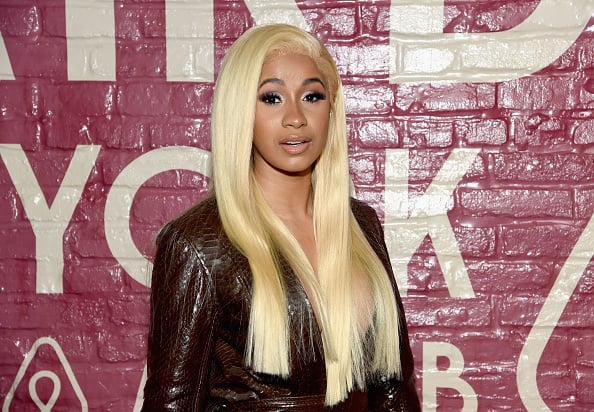What is Cardi B's Net Worth?
Cardi B is an American rapper, producer, reality television star, activist, and entrepreneur who has a net worth of $100 million. Cardi B's $80 million net worth includes an estimated $70 million valuation for her music catalog rights, a number that could increase significantly over time.
Cardi B (born Belcalis Marlenis Almánzar) rose from humble beginnings in the Bronx to become one of hip-hop's most influential figures. She first gained public attention through viral videos on social media, showcasing her unfiltered personality before joining the reality show "Love & Hip Hop: New York" in 2015.
Her breakthrough came with the 2017 release of "Bodak Yellow," which topped the Billboard Hot 100, making her the first female rapper to do so with a solo track since Lauryn Hill in 1998. Her debut album "Invasion of Privacy" (2018) was critically acclaimed, winning Best Rap Album at the Grammy Awards—the first solo female artist to achieve this honor.
Cardi has continued to release chart-topping hits like "I Like It," "WAP," and "Up," known for their catchy hooks and bold lyrics. Beyond music, she's expanded her influence into fashion, film, and activism, using her platform to speak on political and social issues.
Outside of music, Cardi is a social media mega-star. She has more than 169 million followers on Instagram, more than 7 billion YouTube streams, 30+ million monthly Spotify listeners, and more than 22 million TikTok fans.

Getty
Early Life
Belcalis Marlenis Almánzar was born on October 11, 1992, in Manhattan and raised in The Bronx, New York City. She is the daughter of a Dominican father and a Trinidadian mother and has seven siblings, the most well-known of which is her sister, Hennessy Carolina. After attending Renaissance High School for Musical Theater & Technology, Cardi B began stripping at the age of 19, crediting it as a positive experience: "[Stripping] really saved me from a lot of things. When I started stripping I went back to school." She attended the Borough of Manhattan Community College before eventually dropping out.
She developed the stage name "Cardi B" as a derivation of Bacardi, a rum brand, which was her former nickname. In 2013, she began to gain notoriety and popularity due to several videos of her going viral on social media, such as the video-sharing app Vine and her Instagram page.

Matt Winkelmeyer/Getty Images
Career Beginnings
Cardi B joined the cast of the VH1 reality television series "Love & Hip Hop: New York" in 2015, debuting in season six of the show. She gained a large fan base on the show, with Jezebel considering her the breakout star of the sixth season. After two seasons, she announced in December 2016 that she would be leaving the show to focus on her own budding career in music.
Music Career
Cardi B's musical debut came in November 2015, prior to her announcement that she was leaving "Love & Hip Hop." She was featured on singer Shaggy's remix of his single "Boom Boom" alongside Jamaican dancehall singer Popcaan. Her music video debut came in December 2015 with "Cheap Ass Weave," her version of rapper Lady Leshurr's "Queen's Speech 4." March 2016 saw Cardi B release her first lengthier project, the mixtape "Gangsta Bitch Music, Vol. 1." She was featured on the 2016 compilation album "Underestimated: The Album," a collaboration between her and fellow KSR Group artists HoodCelebrityy, SwiftOnDemand, Cashflow Harlem, and Josh X. During this period, Cardi B continued to build her name and following through appearances on shows such as "Uncommon Sense with Charlamagne" and Khloe Kardashian's "Kocktails with Khloe."
Her big breakthrough came in February 2017, when she signed a recording contract with major record label Atlantic Records. The previous month, she had just released her second mixtape, "Gangsta Bitch Music, Vol. 2" (Jan. 2017). She was nominated for Best New Artist and Best Female Hip-Hop Artist at the 2017 BET Awards, although she failed to win any. She did, however, perform at the BET Awards Afterparty show. Subsequently, she appeared on the cover of The Fader's Summer Music July/August 2017 issue.

Cardi B Net Worth (Jamie McCarthy/Getty Images)
On June 16, 2017, Cardi B released her commercial debut single "Bodak Yellow" with Atlantic Records. To promote it, she performed on "The Wendy Williams Show" and "Jimmy Kimmel Live." As it steadily climbed the charts, hitting number one on the Billboard Hot 100 chart in September 2017, Cardi B became the first female rapper to reach number one with a solo single since Lauryn Hill's "Doo Wop (That Thing)" in 1998. Celebrated by an editor of The New York Times as "the rap anthem of the summer," "Bodak Yellow" was certified septuple platinum by the RIAA. It also received nominations for Best Rap Performance and Best Rap Song at the 60th Grammy Awards and won Single of the Year at the 2017 BET Hip Hop Awards.
"Invasion of Privacy," Cardi B's debut studio album, was released in April 2018 to critical acclaim. The album hit number one in the United States, and Cardi B became the first female artist to chart 13 entries simultaneously on the Billboard Hot 100, as every song off the album entered the April 21 chart. It was certified double platinum by the RIAA in October 2018. Time and Rolling Stone magazine both named "Invasion of Privacy" the best album of the year, and Time also included Cardi B on their annual list of the 100 most influential people in the world.
Notable collaborations Cardi B has worked on include "No Limit" (2017) with G-Eazy and ASAP Rocky, "MotorSport" (2017) with Migos and Nicki Minaj, "Girls Like You" (2018) with Maroon 5, "Taki Taki" (2018) with DJ Snake, "Tomorrow 2" (2022) with GloRilla, "Shake It" (2022) with Kay Flock, "Put It on da Floor Again" (2023) with Latto, "Jealousy" (2023) with Offset, and "Point Me 2" (2023) with FendiDa Rappa.
In December 2022, Cardi B earned $1 million for a 35-minute private performance at the Miami Art Basel.

Gustavo Caballero/Getty Images
Other Creative Pursuits
Cardi B's film debut came in the 2019 film "Hustlers," which received critical acclaim. She also worked on the film "F9," released on May 22, 2020, by Universal Pictures. Along with Chance the Rapper and T.I., Cardi B was confirmed as a judge on the Netflix competition and talent search series "Rhythm + Flow," which premiered on October 9, 2019. In 2020, she premiered her series, "Cardi Tries," via Facebook Messenger, a web series that ran for three seasons.
Business Ventures and Endorsements
Cardi B's first endorsement deal was her 2016 campaign with New York lingerie chain Romantic Depot. Her ads for the brand appeared on the radio and cable TV. Other partnerships she's had include those with MAC Cosmetics, Gypsy Sport, Reebok, and Pepsi. In November 2018, she released a clothing collection with fast fashion clothing brand Fashion Nova.
In 2022, Cardi B became the creative director of Playboy magazine. In February 2023, Cardi B and Offset partnered with McDonald's for the Cardi B and Offset meal to launch on Valentine's Day.

(Photo by Dave Kotinsky/Getty Images)
Personal Life
In early 2017, Cardi B began publicly dating rapper Offset from the hip-hop group Migos. The couple became publicly engaged in October of that same year after Offset proposed during the Power 99 Powerhouse concert, although TMZ revealed in 2018 that their marriage license indicates the couple married secretly in September 2017. Cardi B later confirmed this revelation on social media. She gave birth to their daughter in July 2018. After separating and getting back together several times, the couple had their second child together, this time a boy, in September 2021. On the fifth anniversary of their marriage, Cardi B announced plans for an official wedding. In December 2023, Cardi confirmed over social media that she and Offset were no longer together. On August 1, 2024, it was revealed that Cardi had filed for divorce from Offset.
In September 2022, Cardi B surprised her old elementary school in the Bronx and donated $100,000 to the institution.
In September 2025, Cardi revealed she was expecting a baby with NFL player Stefon Diggs.
Real Estate
In December 2019, the couple purchased a mansion in Buckhead, a suburb of Atlanta, Georgia, that was listed at $5.79 million. They paid $5.5 million for the mansion. In 2017, the house was listed for $10 million. Here's a video tour of the property:
Cardi B Net Worth History
- Cardi B was first added to Celebrity Net Worth on January 12, 2016, with a net worth of $400 thousand.
- Her net worth was updated to $1.5 million on February 9, 2017, and then again to $4 million on September 25, 2017.
- In August 2018, her net worth was updated to $8 million. In May 2019, her net worth was updated to $12 million.
- After earning $28 million (before taxes) between October 2018 and October 2019, her net worth was updated to $22 million.
- By the end of 2021, Cardi's net worth was $40 million
- In mid-2024, Cardi's net worth had doubled to $70 million
/2019/02/GettyImages-919772206.jpg)
/2018/02/Offset.jpg)
/2020/02/megan-thee-stallion-1.jpg)
/2018/09/to.jpg)
/2018/05/Lizzo.jpg)
:strip_exif()/2009/12/Nicki-Minaj-1.jpg)
/2019/11/GettyImages-1094653148.jpg)
/2020/01/lopez3.jpg)
/2020/04/Megan-Fox.jpg)
/2018/03/GettyImages-821622848.jpg)
/2019/10/denzel-washington-1.jpg)
/2020/02/Angelina-Jolie.png)
/2009/09/Brad-Pitt.jpg)
:strip_exif()/2015/09/GettyImages-476575299.jpg)
/2009/09/Cristiano-Ronaldo.jpg)
/2020/06/taylor.png)
/2009/11/George-Clooney.jpg)
/2019/02/GettyImages-919772206.jpg)
/2018/02/Offset.jpg)
/2013/12/rem.jpg)
/2020/01/post-malone.png)
/2020/02/megan-thee-stallion-1.jpg)
/2019/11/safaree.png)
/2019/09/travis-scott.png)
/2019/10/DaBaby.jpg)
/2009/09/Jennifer-Aniston.jpg)
/2017/02/GettyImages-528215436.jpg)
:strip_exif()/2009/09/P-Diddy.jpg)